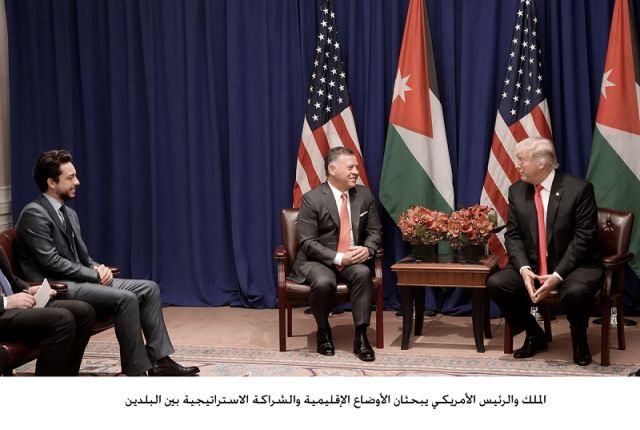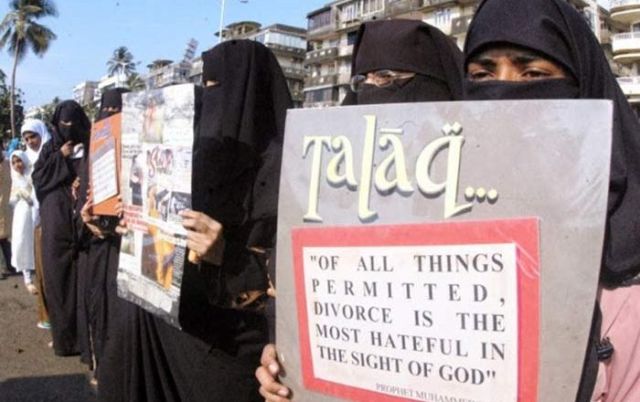
by admin | May 25, 2021 | Muslim World
 New York : Jordanian King Abdullah II on Wednesday held talks with U.S. President Donald Trump, focusing on efforts to revive the peace process and the overall developments in the Middle East.
New York : Jordanian King Abdullah II on Wednesday held talks with U.S. President Donald Trump, focusing on efforts to revive the peace process and the overall developments in the Middle East.
During the talks, which attended by Crown Prince Prince Al Hussein Bin Abdullah, the two leaders reviewed ways of enhancing cooperation and the strategic partnership between Jordan and the United States in various fields.
They emphasized the importance of boosting bilateral coordination and consultation on various issues. In remarks to reporters, the King thanked the U.S. president for his support to Jordan, offering at the same time his condolences over the victims of the hurricanes that hit the country recently.
The talks stressed on the need to intensify efforts aimed at moving the peace process forward through re-launching serious and effective negotiations between the Palestinians and the Israelis. In this context, the King emphasized the importance of the U.S. role in urging the Israelis to consider such efforts seriously, Petra reported.
On his part, King Abdullah warned that the failure to reach a just and lasting solution to the Palestinian issue based on the two-state solution undermines security and stability in the region and the whole world and fuels violence and extremism in the Middle East.
On the Syrian crisis, the two leaders stressed the need to intensify efforts to find a political solution to the crisis through the Geneva process in a way that preserves Syria’s territorial integrity and the safety of its people.
In the same context, King Abdullah and President Trump underlined the importance of the recent ceasefire agreement in southwestern Syria, which was reached between Jordan, the United States, and Russia. They said the agreement should act as a model that can be applied in other parts of Syria.
The talks also focused on counterterror efforts, stressing the importance of intensifying stepping up such efforts, both regionally and internationally, within a holistic strategy to address this danger, which threatens global peace and security.
“I’m very grateful for your support to our country in these difficult times and the special bond between our two nations.” “Terrorism is a scourge around the world, but I think Jordan will always stand beside you and your country. And we will overcome,” the King said.
From his side, President Trump said: “It’s a great honor to be with the King, who has been our partner and ally for a long time. And I think never has the relationship been better than it is right now.” “We’re working together on many problems and some things that aren’t problems that are very, very good. But we’re going to make some of the bad ones turn out good,” Trump added.
—SM/IINA

by admin | May 25, 2021 | Opinions
 By Frank F. Islam,
By Frank F. Islam,
On August 22, the Supreme Court ruled that triple talaq — the practice which allows a man to divorce his wife instantly by saying the word talaq thrice — is unconstitutional. Predictably, the ruling was denounced by a number of Muslim leaders and organisations. Some interpreted it as an attack on their religion and way of life. Others saw a conspiracy angle in the importance given to an issue.
This perspective is desperate and distorted. This perspective is not only wrong but also wrong-headed, misplaced and misguided.
I applaud this judgement because I strongly believe that Muslim instant divorce is illegal and incorrect in many ways. Instant divorce is deplorable, disgraceful and shameful. In addition, it is demeaning, demonising, disheartening and demoralising to Indian Muslim women.
Most importantly, as one of the judges pointed out, triple talaq is against the basic tenets of the Quran. Recognising this, many Islamic countries, including two of India’s large Muslim neighbours — Pakistan and Bangladesh — have abolished the practice.
In addition, it is unconscionable to think that a man should be allowed to banish a woman to whom he is married — who is also the mother of his child or children, in many cases — by uttering a word three times, with no consequences. Triple talaq is also inherently discriminatory in that only a man has that “right” — a Muslim woman cannot end the marriage in a similar way.
Over the years, some Muslim organisations have rationalised triple talaq by arguing that divorce rates within their community are quite low compared to other religious groups. It affects less than a third of a per cent of Muslim women, they argue. This is neither a sound legal nor moral argument. Even if one concedes that instant divorce affects only a minuscule population, injustice should never have legal sanction, regardless of how many people are affected.
The triple talaq ruling, the result of a decades-long campaign by women’s rights groups, was a historic verdict. With the stroke of a pen, the judges made illegal a practice that over the decades has ruined the lives of countless Indian Muslim women.
In the absence of a comprehensive study among Indian Muslim women, it is not known how many of them have been divorced in this manner. A 2013 survey of Muslim women in 10 Indian states by the Bharatiya Muslim Mahila Andolan, an advocacy group that fights for the rights of Indian Muslims, found that triple talaq was the most common mode of divorce among those surveyed.
Of the 4,710 women sampled in the survey, 525 were divorcees. Of them, 404 were victims of triple talaq. More than 80 per cent of them did not receive any compensation at the time of divorce.
Two of the five judges that delivered the triple talaq judgment differed on the constitutionality of practice. The bench was in unanimous agreement, however, in asking the government to enact within six months legislation to govern Muslim marriages and divorces.
India’s justice system has numerous drawbacks. It often takes decades for courts to deliver justice. In this instance, the Supreme Court should be applauded for delivering a correct judgment in a timely manner.
The ball is now in the government’s court. It is up to people’s representatives to come up with policies that will change the lives of Muslim women for the better.
Equitable legislation on Muslim marriages and divorces should be just the starting point. The central and state governments must craft policies that empower women belonging to all castes, creeds and religions. Such policies should focus on educating women, developing their skills and making them part of the work force. Empowerment of this type will allow them to pursue and create their own destiny. It will lead to financial independence. In addition, it will promote the security and stability of women and will build their self-esteem and confidence.
India’s Muslim community should embrace the Supreme Court verdict. They should join together to say: End triple talaq. End triple talaq. End triple talaq. They should leverage the verdict as an opportunity to advocate for and bring about much-needed reforms related to women’s rights.
(Frank Islam is an entrepreneur, civic leader and thought Leader based in the Washington DC area. The views expressed are personal. He can be contacted at ffislam@verizon.net)
—IANS

by admin | May 25, 2021 | News

A view of the AIMPLB meeting in progress
By Pervez Bari,
Bhopal, Sep 12 : The All India Muslim Personal Law Board, (AIMPLB), has passed a resolution to constitute a committee to examine the Supreme Court judgement on instant Triple Talaq to see the inconsistencies, if any, with the Islamic Shariat. The Committee shall also advise the method and process for undertaking large scale community reform programme within the Islamic Sharia (Islah-e-Mashrah).
The above decision was taken by the AIMPLB in its Executive Committee’s marathon meeting here on Sunday. The Board again accused the government of attempting an attack on Muslim personal laws, and welcomed the court order for not going in that direction. The meeting did not discuss filing a review petition against the Supreme Court order holding instant triple talaq (Talaq-e-Biddat) illegal.
It may be recalled here that on August 22, a five-judge Bench of the Supreme Court, by a 3-2 majority verdict, had held the practice of instant triple talaq illegal. Several Muslim organisations, including the Jamiat Ulama-i-Hind, among the oldest in the country, had objected to this, saying that instant triple talaq should continue and be recognised as a legitimate divorce among Muslims even if that meant courting punishment as per the law of the land.
Addressing a joint Press Conference Executive Committee Members said the AIMPLB has further resolved to initiate different programmes at different levels to educate Muslim women and men on Shariah and in this process it shall take assistance from different organisations. The Board also resolved to take appropriate steps to ensure help to divorced ladies. It shall urge upon the government to grant financial assistance to Waqf Boards for this purpose.
Kamal Farooqui, member of the Executive Committee, on behalf of the Board made a categorical statement that the Muslim Community cannot and shall not tolerate such attack on personal law of the community. He said in the light of the Government India had laid bare its intention in the form of Attorney General’s submission in the Supreme Court that all forms of dissolution of marriage without intervention of the court should be declared as unconstitutional.
“We record our displeasure and consider it as attack on personal law of Muslims. This stand of the present government is contrary to the protection guaranteed by the Constitution of India”, Farooqui emphasised.

Dr. Asma Zehra, the convenor of AIMPLB’s Women Wing, addressing Press Conference at Bhopal
Replying to a question Dr. Asma Zehra, the convenor of AIMPLB’s Women Wing, Board’s position, as per Shariah applicable the four Sunni School of thought has been that the Talaq-e-Biddat is sinful but valid. Prior to the judgement the Board had already submitted to the Supreme Court that the AIMPLB had passed a resolution on 16-04-2017 stating that those who indulge in Talaq-e-Biddat should be socially boycotted.
Dr. Zehra pointed out Sunday’s resolution said Islamic/Sharia law is based upon Quran, Hadith, Ijma and Qiyas and that the sanctity of belief and practices in personal/matrimonial relationship in Islamic laws cannot be treated differently from the belief and practices in personal/matrimonial relationship by other citizens who follow own customs and practices.
She claimed 99 per cent of Muslim women are in favour of Muslim personal law. “In the name of showing sympathy with Muslim women, a door is being opened to interfere in our religion.” She added that there would be a lot of difficulties in implementing the SC order on triple talaq.
Babri Masjid case
Meanwhile, the AIMPLB executive committee also expressed its surprise over the Supreme Court’s decision to begin hearing the Babri Masjid case on a daily day-to-day basis. Noting that the court had previously found it impossible to speed up the hearing because it had to go through a lot of documents, the board said it would abide by whatever the court decides. However, the process has to be judicial without bringing politics into it. It’s related to property, it’s a title suit.
Adv. Zafaryab Jeelani, member of the Executive Committee, said the court had now given very little time to the two parties, and that there was not enough time to translate all the documents. Saying “we would do our best”, the board said, “We feel this may be used as a plank by a certain political party. We want the might and respect of the court should not be compromised. Court is our last resort.” “Justice hurried is Justice buried”, he quipped.

by admin | May 25, 2021 | Business Summit, Events, Muslim World
 Astana : The ministerial meeting, preparatory to the OIC Summit on Science and Technology, started in Astana, Kazakhstan on Saturday.
Astana : The ministerial meeting, preparatory to the OIC Summit on Science and Technology, started in Astana, Kazakhstan on Saturday.
Addressing the opening session, OIC Secretary General Dr. Yousef A. Al-Othaimeen said that this summit is a historic event because it is the first ever Summit of the OIC heads of state and government dedicated to the promotion and advancement of science and technology as an enabler and driver of socio-economic development of OIC countries. “This summit is unique in its premise as it affirms that Islam is a religion of thought, reason and science that liberates from the slavery of illusions and myths, and calls for a middle stance and for combating radicalization.”
Ministers of science and technology from the member states discussed and adopted the ‘OIC Science, Technology and Innovation Agenda 2026’ as prelude to its consideration and adoption by OIC leaders during the First OIC Summit on Science and Technology, which will start tomorrow. Al-Othaimeen emphasized that the OIC Science, Technology and Innovation Agenda was drawn up after extensive consultations with 157 scientists and technologists from 20 OIC countries and has been further enriched in light of the recommendations received from the member states. He affirmed that the Agenda presents a holistic view of emerging science and technology, and its social and economic spinoffs. “The document sets priorities and specific recommendations to help member states in tackling the challenges of improving education standards, creating employment opportunities for the youth, mitigating the adverse impact of climate change, and the work for improving human health, energy and water resources”, he underlined.
Furthermore, he highlighted, the document lists some big science programs, which can be jointly undertaken by several countries, stating that these projects will be key enablers for building the knowledge economy and industrializing the economies of member states. Al-Othaimeen also underlined that the success of the proposed ‘OIC STI Agenda 2026’ depends upon mutual cooperation and collaboration among OIC member states. He called for shifting from national programs to cooperative and complementary activities.
In his speech, Yerlan Sagadiyev, Minister of Education and Science of Kazakhstan, welcomed the participants, affirming that holding the OIC S&T Summit in Astana is proof of the priority OIC member states giving to science, technology and innovation.
—HA/IINA

by admin | May 25, 2021 | Muslim World
 Riyadh : Iranians and Qataris are among the more than 1.7 million Muslims gathered in the holy city of Mecca for the Hajj pilgrimage, even though the governments in Tehran and Doha are at odds with Saudi Arabia.
Riyadh : Iranians and Qataris are among the more than 1.7 million Muslims gathered in the holy city of Mecca for the Hajj pilgrimage, even though the governments in Tehran and Doha are at odds with Saudi Arabia.
Despite closing the border with Qatar on June 5 as part of the Gulf countries’ economic and diplomatic offensive against the gas-rich emirate, Saudi Arabia has allowed 1,340 Qataris to enter the country for the Hajj.
Doha earlier refused Riyadh’s proposal to arrange charter flights for Qatari pilgrims.
The Saudi minister of Islamic Affairs, Saleh al-Sheikh, told his country’s official news agency SPA that the kingdom serves all pilgrims without discrimination or exclusion on the basis of nationality, tribe or sect.
Political tensions are overshadowing the great religious event, but have not prevented 86,500 Iranian pilgrims from coming to Mecca this year after they were excluded last year following a deadly stampede during the 2015 Hajj.
Nearly 2,500 people – including 400 Iranians – died in the stampede, which Riyadh blamed on the Iranians, while Tehran faulted the Saudi government.
The Jeddah-based International Islamic News Agency said that the pilgrims include 25,500 people from the United Kingdom, 20,500 from Russia, 17,000 from the United States and 10,000 from France, among many other nationalities.
For the first time, the Saudi Ministry of Education has established nurseries where parents can leave their children while they perform the rituals of the pilgrimage, which lasts several days and takes place in different places.
Some 15,000 officers will ensure the safety of the Hajj and escort the pilgrims, according to the director of security, Gen. Mohamed al-Sharif.
The head of Saudi civil defense, Suleiman al-Amro, said that more than 3,000 “machines and devices” had been deployed in the holy places to respond to possible emergencies.
Besides the deadly stampede, the 2015 Hajj was also marred by a crane accident at the Great Mosque that left 100 people dead.
—IANS

 New York : Jordanian King Abdullah II on Wednesday held talks with U.S. President Donald Trump, focusing on efforts to revive the peace process and the overall developments in the Middle East.
New York : Jordanian King Abdullah II on Wednesday held talks with U.S. President Donald Trump, focusing on efforts to revive the peace process and the overall developments in the Middle East.




